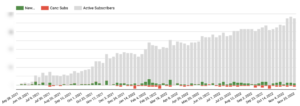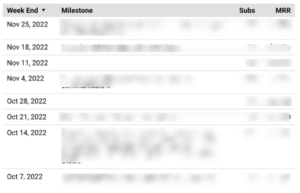Commitment = Exposure
In Steven Pressfield’s book, “Put your ass where your heart wants to be,” he defines commitment as exposing yourself.
Funnily enough, sooner, on the same day, my wife and I were looking at our yearly income since 2012, and we noticed something.
During our first seven years together, we just “ate bush” – as we say in Brazil. But since 2020, our lives have gotten significantly better. So, looking at that, we did what any human being would do: we started to look for that critical moment that unlocked all of this. We were looking for the silver bullet.
Instead, we found that there wasn’t a single heroic act that changed everything. It was more like the seeds we planted suddenly started to blossom “out of the blue” after a few years of grinding.
And then, looking closely at how those seeds were planted, we noticed that it came with lots of exposure and real-life consequences. So, yes, Mr. Steven, I agree with you.
To make it tangible, I’m talking about things like going bankrupt twice in the same year. Or having to sleep in your aunt’s living room for a few months when you’re expecting your second kid. Having no vacation whatsoever for eight years straight. Happily accepting a demotion. Developing a chronic illness from overworking and living a sedentary lifestyle for years. Being crazy enough to quit a well-paying dream job with a fancy title for the uncertainty of being an independent consultant.
But each and every one of those things also provided a stepping stone or forced me to find a new path – and those would always be much better than the one I was in before.
Then, sometimes someone will come and ask how did I make it “Head of” in my twenties or how I’m able to ship so much stuff and grow my career so fast (by the way, I don’t feel like I’m successful yet or that productive. But I understand why it might look like that from other people’s point of view).
My usual response is that it is as much about the sacrifices you choose to make as it is about dedicating yourself to your life’s work. I’m talking about things like:
Investing in courses and training over traveling and leisure.
Working 60+ hour weeks over having a balanced life during a few months.
Attending work events over eating out with friends or simply being at home.
Embracing financial risk with the possibility of a jackpot over a nice stable job.
Commitment to your life’s work over commitment to building someone else’s dream.
So my follow-up question usually is: if you’re really committed to turning things around, what would you be willing to sacrifice?
And let me be clear here: I’m not advocating for anyone to follow in my footsteps. They were often reckless and unhealthy (I guess the word dumb could also be used to describe certain decisions I’ve made). I could’ve taken things slower. Likely there was an easier path, and now I see I didn’t have to sacrifice my health so much. Still, Amor Fati.
Measuring Growth on a B2B SaaS
In my head, I see Growth from the perspective of filling a leaky bucket:
- There’s how much water you put in
- There’s how much water you lose to leaks
The ratio between the two will determine how fast your bucket fills.
At Easy App Reports, we measure Growth by looking at the following:
- How many new subscribers weekly subscribers we get
- How many do we lose
Below is the graph I stare at during our weekly reviews. In one image, it tells me how are our acquisition and retention going and how fast the business is growing:

I also have a small table with Milestones right beside it. That’s because data without context is just not as helpful or actionable. Having our most significant wins and losses side-by-side with our main KPIs clarifies the things that move the needle.

Then, I use input metrics to visualize how much water is coming on the hose – and how much of that water is staying.
From the acquisition perspective, in our case, that’s traffic and product-led leads.
From the retention perspective, it’s all about activation rates (the percentage of new users who manage to set up and use the product for the first time within their first week). We know that because we were able to establish a correlation between users not being able to activate their connectors with their likeliness to churn within the first days after subscribing.
To wrap up:
- Overview (weekly)
- New vs. Canceled Subscribers + Active Subscribers
- Milestones and MRR (Monthly Recurring Revenue)
- Input Metrics (daily)
- Acquisition: Traffic, Leads, and Conversion Rates
- Retention: D7 Activation Rate
Having a look at these takes just a few seconds, and it provides me with everything I need to know about how the product is performing.
📕 Books I’m reading
- My favorite quotes from one of the best books that most people won’t read, “Put your ass where your heart wants to be” by Steven Pressfield (BR):
- When I sit down to write in the morning, I literally have no expectations for myself or for the day’s work. My only goal is to put in three or four hours with my fingers punching the keys. I don’t judge myself on quality. I don’t hold myself accountable for quantity. The only questions I ask are: did I show up? Did I try my best?
- Are you “there”? Or are you somewhere else?
- Only when the pain of not doing it got greater than the imagined pain of doing it did I somehow find the balls to pursue what I really wanted and had been obsessed by.
- You can be a full-time writer, one hour a day.
- The ability to self-reinforce is more important than talent.
- The Consulting Bible (PT-BR): let’s see what ChatGPT has to say about it:

Yeap. That’s accurate.
🛠 Tools I’m using
Numi: the most beautiful and useful calculator you have ever used (probably). What I love about it is that I can label my numbers, making it super easy to share formulas and calculations with the people I work with. 10/10.


